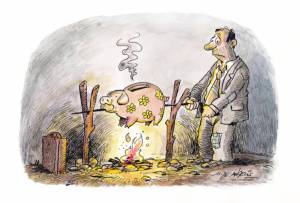Forum: The one thing that AI can’t replicate: our wondrous flaws
Published 1:30 am Saturday, January 18, 2025
By Ron Friesen / Herald Forum
Are you worried about articial intelligence? That it could take over?
Don’t worry. AI has a critical flaw which makes it impossible to replace humans.
What’s that flaw, you ask? It’s its perfection. Crazy? No.
Humans are the most complex creatures imaginable. No two are exactly alike. No two think exactly alike. Then add this complexity: Flaws. We all have them. In fact, flaws make us perfectly human.
One of my grandsons asked me to listen to some music from a video game he likes. He said the music sounded like real instruments were used. So I listened. The incredible sound was from a lavishly instrumented orchestra, which I immediately loved.
But the music wasn’t from a “real” orchestra. It was from a computer and was generated in a similar way that AI generates pictures.
My grandson asked how I could tell. I said, “It was too perfect.” There wasn’t a single flaw. All the notes were perfectly the same, and the ensemble playing was perfect. Human musicians aspire to this level of perfection. And they come close.
When the Seattle Symphony played John Williams’ score with a live showing of the first “Star Wars” movie, it was electrifying! And it was as perfect as those incredible musicians could make it. But it wasn’t “AI perfect,” which made it even better!
Each musician put their sound and soul into every note, which meant there were infinitesimal dierences as the notes were played, just as the brush strokes of an artist are similar, but never identical. It was the lack of rigid identicalness that made the live orchestra’s music spellbinding. There were flaws — uniqueness — as each human played and adapted to each other.
Humans also need other humans to understand our differences to be able to adapt with them. When I call for help and get a robot, it’s always bad news. Especially when I hear, “You’re call is important to us.” I usually call because the web page or app is not designed for my question or needs, or it just is not working. Also, I am old and flawed. Sometimes I do not operate the app or program as perfectly as is required.
I need help from a human.
The great robots and their AI technology cannot and will not adapt to me. I have to adapt to them. AI is “perfect.” I am not. The robot, the app, and AI do not understand this. Only their programmed idea of “perfection” is understood, and I am compelled to adapt. I wonder if this is facism in our technology: It is right; it is the only way; I must conform.
I am increasingly aware of how important our flaws are, because that makes all of us who we are. We care, we love, and we adapt because we love and care. We understand and listen. We can see what needs to be done without being told because we love and we care.
It is this loving and caring with all our flaws which makes our families and communities stronger and better. (And it makes incredible music!) AI and robots can’t do this.
But the darker concern is if humans can be robots.
As we prepare for 2025 and beyond, watch out for corporations, billionaires, and elected ocials who only care about money and power. These are the uncaring “robots” in our culture, economy, and government, and they don’t care about you or me.
They do not see themselves as one of us, but as being over us. Robots.
I want humans who love and care to be in charge. I will resist the “perfection” required by AI generated robots as well as the human ones. I value humans
because of our “perfect imperfections” as John Legend sings in “All of Me Loves All of You.”
Our flaws. Our humanity. Our perfection.
Ron Friesen is a Marysville resident, a retired music teacher and community and church musician and is committed to community improvement.




